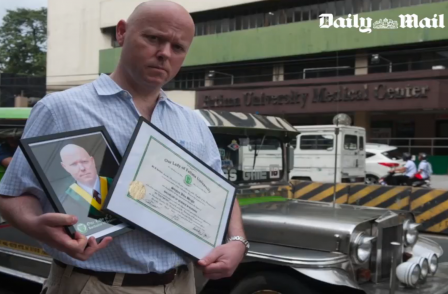
Police have praised the Daily Mail for the “invaluable” help the paper gave the investigation into a nurse who poisoned more than 20 patients at a Stockport hospital.
Victorino Chua, 49, was convicted this week of killing two patients and harming others by deliberately contaminating medical supplies with insulin.
The Daily Mail’s role in helping to bring him to justice can only now be revealed.
Daily Mail associate news editor Stephen Wright (pictured) travelled to the Philippines following Chua’s arrest in January 2012 and discovered he had a criminal past in his home country and doubtful nursing qualifications. This was about 18 months before UK police travelled to Manila.
The Daily Mail did not publish its story, in order not to prejudice any future trial, but instead passed on a dossier of evidence to Greater Manchester Police.
Detective Superintendent Simon Barraclough, who led the Stepping Hill Hospital murders inquiry, said: “I would like to thank the Daily Mail for providing Greater Manchester Police (GMP) with vital background information about Chua at a very early stage of our inquiry into him.
“Recognising the importance of the case, and the wider issues of patient safety, Mail journalist Stephen Wright passed on concerns about Chua’s bona fides and the trade in nursing qualifications in the Philippines more than three years ago.
“The information he passed on was invaluable in terms of our understanding of Chua.
"This is an example of how the media and the police can work together – in a professional way – for the public good.”
Wright travelled out to Manila with Mail photographer Jamie Wiseman in January 2012 to investigate Chua’s background. After meeting local police, and speaking to Interpol, they discovered that he may have stood trial in Manila.
Wright successfully applied to a local judge to see court files proving that Chua had stood trial on suspicion of stealing from a hospital, but the case had been dropped).
Wright, a former crime editor at the Mail, said he believes it would have been much harder to obtain such court files in the UK.
He told Press Gazette: “It’s extraordinary that at the moment, press freedom in a developing country is better than in the UK when it comes to dealing with police and law enforcement agencies. People are scared of their own shadow here.”
Wright then tracked down the administrator of Chua’s former nursing college (now defunct) to a slum district of Manila. He found that Chua had qualified as a nurse, despite the word ‘fail’ appearing on much of his college paperwork.
Wright was also concerned that the "administrator" was accepting fees to confirm the qualifications of former graduates trying to work overseas.
The Mail pair also tracked down Chua’s mother and a sister who “confirmed he had left his previous employment under something of a cloud”.
Wright said: “The whole thing looked very suspicious. The decision was taken not to print the story at that stage because he had been arrested but not charged.”
Following Wright’s return from the Philippines he raised his concerns about Chua’s background with a senior Met Police officer who put him in contact with the senior investigating officer at Greater Manchester Police.
Wright said: “We took the view that the implications of all this were very serious indeed and decided to hand over our dossier on Chua.”
After police visited Manila they alerted the Nursing and Midwifery Council to concerns about the trade in fake nursing qualifications. An urgent reviewing of vetting procedures for foreign nurses was carried out.
Wright said: “There was a situation where we could have published background material on Chua at the risk of undermining his right to a fair trial, or passed this critical background information to police who were at a very early stage of their investigation. The right thing to do was undoubtedly the latter.
“Those in the police who don’t want to deal with the media might want to read this very carefully and see the benefits of engaging with journalists.’’
The Daily Mail noted in yesterday’s paper: “Since the Scotland Yard phone hacking scandal and subsequent 2012 Leveson Inquiry into press standards, relations between the police and the media have been put under enormous strain. A number of chief constables have effectively banned their officers from having informal contact with reporters.”
Ex-Met murder squad chief Hamish Campbell: "When the Greater Manchester Police (GMP) investigation into Chua was in its earliest stages in 2012, I became aware that Stephen Wright had already travelled to the Philippines to make his own background enquiry of Chua. This was at a time when detectives from GMP had not yet travelled there and thus were blind to some critical information.
"Stephen's findings, which for the benefit of the public he agreed to share with detectives, were of great importance for the GMP and their investigation.
"As then head of the Met Police Homicide Command I spoke with the senior investigating officer in GMP and told him of Stephen's findings and that they needed to speak with each other very quickly. And they did, within 24 hours they had met.
"The Chua case has identified significant issues across a spectrum of issues, but one successful fact was the professional co-operation between the police and the media and an ability to work on an issue of real importance and ensure valuable background information was secured."
While in Manila, Wright also uncovered extensive evidence around the trade in fake nursing qualifications. He was able to acquire for himself a full set of bogus nursing documentation for £43.
Email pged@pressgazette.co.uk to point out mistakes, provide story tips or send in a letter for publication on our "Letters Page" blog

